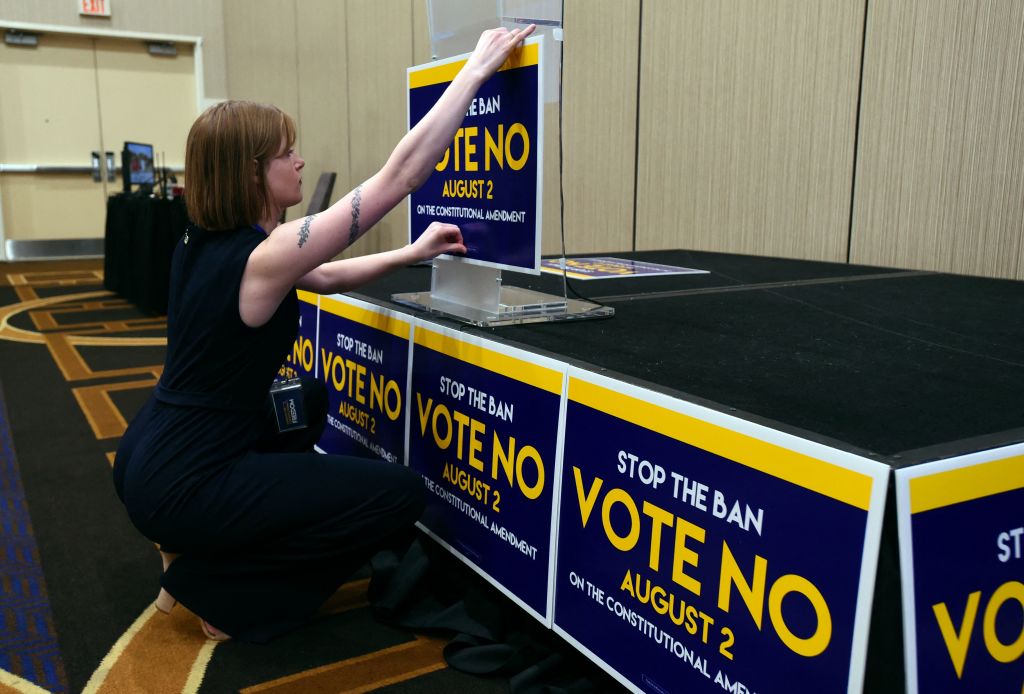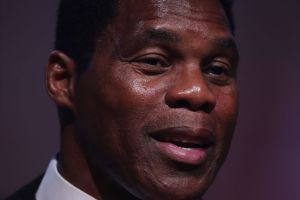The case for Democratic optimism
Maybe everything is going to be fine. Or, at least, not a total disaster. These are the optimistic thoughts that some Democrats are all of a sudden allowing themselves to think. Two recent developments have helped fuel this unexpectedly upbeat mood in a party that has sometimes seemed resigned to midterm wipeout.
First, there was Tuesday’s pro-choice victory in deep-red Kansas that has triggered bullishness on the galvanizing, turnout-boosting power of Dobbs.
Second, Kyrsten Sinema and Chuck Schumer reached a deal that means the Arizona senator will sign up to a modified version of the reconciliation bill that Joe Manchin unexpectedly gave the green light to last week. That means that, barring some unforeseen hiccup, the dubiously named Inflation Reduction Act will soon pass.
In an essay for the American Prospect, Democratic pollster Stan Greenberg marshals survey evidence to support the claim that his party has a path to victory in November. The economic mood may be bleak, argues Greenberg, but in spite of discontent relating to the cost of living, things don’t look quite so grim on the generic Congressional ballot. “A great portion of the change in the midterm outlook has to do with the repeal of Roe v. Wade,” he writes.
The numbers show a boost for Democrats among white suburban women, a group that, in Greenberg’s words, are “delivering some base-like numbers after a few years of seeing this group being diverted by other issues.” Greenberg, in other words, has reached the same conclusion as the man who did more to secure the repeal of Roe than anyone else. Donald Trump’s initial, behind-closed-doors reaction to the Dobbs ruling was, reportedly, to fret about the risk of a backlash from this important slice of the electorate, suspecting that the decision would be “bad for Republicans.”
At this stage, the only honest thing that can be said about the impact of abortion’s fresh salience on November is that it is an unpredictable complicating factor. It may be understandable that pro-life campaigners have not exactly been preoccupied by the secondary political consequences of their Supreme Court victory. But a party fully aware of the profound ways in which Roe transformed politics shouldn’t be surprised if its repeal changes politics again — and in less advantageous ways.
Much depends on how the abortion issue plays out in the coming months. Do Democrats aggressively push for a hyper-permissive liberalization? Do Republicans find themselves and energize previously demotivated Democratic voters?
While abortion has the potential to change the political outlook, don’t hold your breath about the game-changing potential of the Inflation Reduction Act. It may give Democratic lawmakers something to point to when the voters ask them what they have been doing for the past two years, but it is hard to see how it delivers anything more than a minor change to an economic debate which is deeply unfavorable for Democrats at the moment. Even Greenberg’s rather quixotic plan for victory acknowledges that his party has a large disadvantage on the economy and that only a Herculean effort can close the gap.
More important than the sort of messaging change that Greenberg wants are economic fundamentals: whether or not wages are falling in real terms, whether or not the economy continues to shrink, whether there are signs that inflationary pressure is easing. Squint and you can see how better economic news could combine with abortion, an unexpectedly productive session in Congress, a weak slate of novice Republican candidates and a right preoccupied by internecine battles over Trump and 2024 to offer up a far more benign environment than many expected come November. A path to victory? Maybe not. But perhaps something closer to a red ripple than a tsunami.
*** Sign up to receive the DC Diary in your inbox here ***
Biden’s jobs surprise
This morning’s robust jobs numbers will further buoy Democrats’ spirits. The White House had set low expectations for the labor market update. A Bloomberg survey of economists predicted a slowdown, at around 250,000 new jobs. The administration preemptively spun slowing job figures as signaling a “transition” from “record-breaking jobs numbers” to “stable and steady growth.” The actual figure was more than double that at 528,000 new jobs: a very pleasant surprise.
Cheney doesn’t pull his punches
Dick Cheney doesn’t mince his words in a new ad for his daughter’s re-election bid. “In our nation’s 246-year history, there has never been an individual who is a greater threat to our republic than Donald Trump,” says the former vice-president. “He tried to steal the last election using lies and violence to keep himself in power after the voters had rejected him. He is a coward. A real man wouldn’t lie to his supporters. He lost his election, and he lost big. I know it. He knows it, and deep down, I think most Republicans know it.”
That rather hyperbolic first claim (more of a threat to the republic than any individual in American history? really?) is unlikely to move the dial in Wyoming, where the polls show Liz Cheney a long way behind Trump-endorsed challenger Harriet Hageman.
What you should be reading today
Daniel McCarthy: Life after liberalism
Rana Mitter: The Chinese baby bust
Ben Domenech: NATO vote shows that conservatives are getting it right
Ramesh Ponnuru, Bloomberg Opinion: The Democrats are taking Joe Manchin for a ride
Renu Mukherjee, City-Journal: A tale of two high schools
Matt Taibbi, TK News: How crazy-ass Tom Cruise and ‘Top Gun’ saved America
Poll watch
President Biden job approval
Approve: 39.6 percent
Disapprove: 56.4 percent
Net approval: -16.8 (RCP Average)
Who do Americans think is the most important problem facing the country?
Inflation: 17 percent
Government/Leadership: 17 percent
Economy in general: 12 percent
Abortion issues: 8 percent
Judicial system/the courts: 6 percent
Unifying the country: 6 percent
Immigration: 6 percent (Gallup)


















